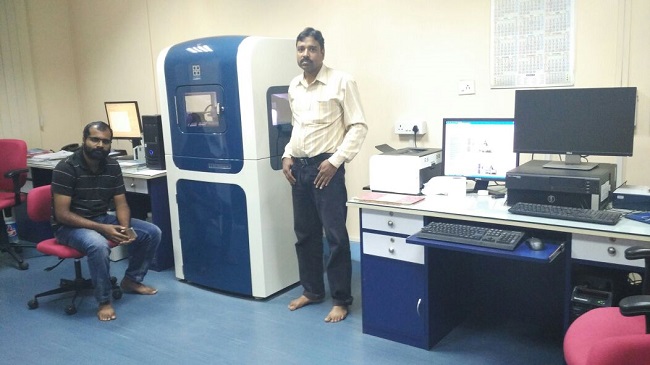- APPLY FOR SLOT
- Internal Users
- External Users
- SLOT BOOKING STATUS
Nano - Indentation & Nano - Tribology Laboratory

Phone : +91-3222-283242
Location : NB / FF / 3, CRF
Facilitator :
Prof. Tapas Laha, Metallurgical & Materials Engineering
Email: laha@metal.iitkgp.ac.in, Contact:+91-3222-283242
For Internal Users - Click Here to apply for Slot
For External Users - Click Here to apply for Slot
Objectives
The nanoindenter (TI-950) with nano-tribological testing facility is a nanomechanical characterization instrument with in-situ SPM (Scanning Probe Microsocopy) imaging facility, through which mechanical properties like hardness, Young's modulus, stress-strain behavior, creep, indentation fatigue resistance and fracture toughness of metals and alloys, ceramics, polymers, thin films, coatings, individual phases in multiphase alloys, composites, soft biological tissues and samples immersed in fluid can be studied. The instrument is capable of carrying out various mechanical testing operations in nano-scale as well as in micro-scale, owing to its dual head testing capability. The various mechanical testing could be carried out at higher temperature (up to 400oC) also. Integrated with low-noise three-plate capacitive transducers and electronics, the multi-layered enclosure and active vibration isolation system provide excellent environmental separation for the instrument.
Available Testing Modes:
- Quasistatic nanoindentation: Measure Young's modulus, hardness, fracture toughness and other mechanical properties via nanoindentation
- Continuous stiffness measurement: Investigate time-dependent properties of materials using a dynamic testing technique designed specifically for polymers and biomaterials
- Scratch testing: Quantify scratch resistance, critical delamination forces, and friction coefficients with simultaneous normal and lateral force and displacement monitoring
- SPM imaging: In-situ imaging using the indenter tip provides nanometer precision test positioning and surface topography information
- ScanningWearTM: Observe and quantify wear volumes and wear rates using the in-situ imaging capability
- Modulus MappingTM: Obtain quantitative maps of the storage and loss stiffness and moduli from a single SPM scan
- 3D OmniProbe: Provides forces up to 10 N and scratch lengths up to 150 mm for depth-sensing micro-indentation and tribological studies
- Higher temperature studies: The facility is capable of carrying out various tests at higher temperature (up to 400oC)
Materials of Interest: Metals and alloys, ceramics, polymers, thin films, coatings, individual phases in multiphase alloys, composites, soft biological tissues and samples immersed in fluid.
People

Prof. Tapas Laha
Facilitator
Metallurgical & Materials Engineering
laha@metal.iitkgp.ac.in
+91-3222-283242
Equipment Details
Model: TI 950 TriboIndenter, Hysitron Inc., USA.
Manufacturer details: Hysitron, Inc., MN 55344 USA
Purchase source (funding): Annual Budget, Central Research Facility, IIT Kharagpur Year of installation: 2012
Utility and Working Principal
| Low Load Head: Two-Dimensional Transducer Assembly - Patented 3-plate capacitive |
|
| Force and displacement feedback control: performech™ Advanced Control Module |
|
| Thermal Drift | <= 0.05 nm/s/oC |
| Quantitative topographical imaging via scanning probe microscopy |
|
| Continuous stiffness measurement: nano DMA III ™ |
|
| Higher load mode: 3D OmniProbe |
|
| Temperature | Range: Room temperature to 400oC |
*: A shorter version of specifications is provided here.
Sample Details
The surface of interest must be mirror polished with perfectly parallel base surface, where the maximum allowable sample dimension is 30 mm X 30 mm X 20 mm. It is requested to contact the Professor-in-Charge for testing (i) samples with other dimensions, (ii) biological samples and (iii) samples immersed in fluid.
